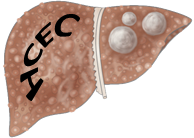2013 HCCEC Meeting Minutes
With support from the National Cancer Institute (NCI) and a philanthropic fund for Gastrointestinal Cancer Research, the first meeting of the Hepatocellular Carcinoma Epidemiology Consortium (HCCEC) was conducted at the Venezia Room of the Treviso Restaurant in Houston, Texas, on Monday, May 6, 2013. The meeting was aimed at developing a strategic plan for collaboration between various North American institutions in a multidisciplinary research approach to studying hepatocellular carcinoma (HCC). Experts in HCC research from 15 institutions attended the meeting. A formal HCCEC Meeting Agenda was planned for the meeting and was distributed to all Investigators before the meeting.
Dr. Hassan opened the meeting with a short introduction and welcome statement, followed by a 20-minute presentation to highlight the main purpose for developing HCCEC. Initiation of a multicenter genome-wide association study (GWAS) was proposed by Dr. Hassan to stimulate collaboration between the investigators from various U.S. centers. The discovery phase of the GWAS was awarded by the Center of Inherited Diseases Research (CIDR) and would use existing resources such as HCC cases and two sources of controls from MD Anderson Cancer Center, Mayo Clinic, and Baylor College of Medicine. The idea of developing a large NIH research proposal to support collaboration between invited centers and other institutions toward the validation phase of the GWAS was the main theme to discuss during the meeting.
After Dr. Hassan’s presentation, Dr. El-Serag provided a detailed presentation about the epidemiology and natural history of HCC, after which Dr. Roberts from Mayo Clinic presented an overall picture of HCC molecular and genetic pathways. In addition Dr. Amos, a well-recognized GWAS biostatistician, provided an overview of methods of analysis and the interpretation of large amounts of genomic data. Dr. Li from MD Anderson then summarized the current laboratory methodology of genomic studies with a detailed comparison of various laboratory techniques and the types of biological samples required by each. Because the HCCEC is a relatively new activity for all participants, we thought we might benefit from the experience of other active and successful consortia such as the Pancreatic Cancer Case-Control Consortium (www.Panc4.org). Thus Dr. Petersen, as leader of PanC4, provided a 30-minute presentation about the secrets of the successful cancer consortium, with special highlights about her experiences in this leadership role.
Using a uniform template of 10 PowerPoint slides, all invited guests from U.S. and Canadian institutions provided short presentations to highlight the trends and referral patterns of HCC at their institutions over the past decades, as well as the numbers of patients diagnosed as having HCC each year at their institutions and the availability of epidemiological and clinical characteristics of these patients. Also presented was a summary of currently active HCC research and available resources for biological samples and epidemiological and clinical data from HCC patient populations.
Open discussions about several points related to collaboration were initiated and included the following:
-
IRB approval and material transfer agreements
-
Cost of biological resources including DNA separation
-
Availability of resources from control subjects
-
Use of the genomic data from PanC4
-
Harmonization of data between collaborative centers
-
Collaboration with NCI
-
Inclusion of minority populations
-
Contact information of other interested centers
-
Future collaboration with international studies
-
Steering Committee definition and request for volunteers
-
Development of a website for the consortium
-
Update the contact information of all investigators
-
Special thanks to the meeting sponsors
